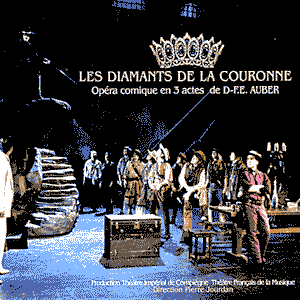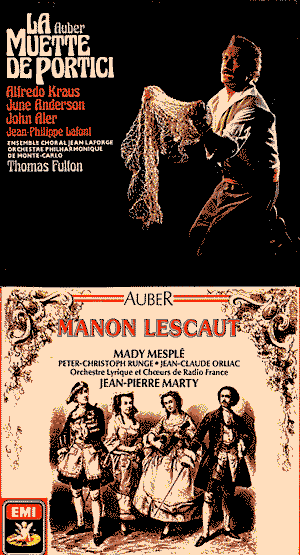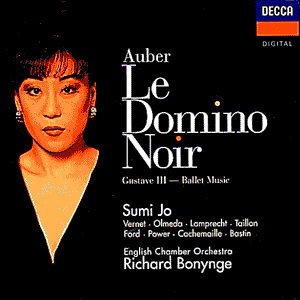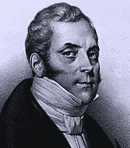 |
Daniel-François
Esprit AUBER (1782-1871)
The Crown of Diamonds (Les Diamants de la Couronne)
- Comic Opera in 3 Acts (1841)
 Ghyslaine Raphanel
(sop), Mylène Mornet (sop), Christophe Einhorn (ten), Armand
Arapian (bar), Dominique Ploteau (ten), Paul Médioni (ten),
Nicolas Gambotti (ten), Sébastien Lemoine; Cori Spezzati, Orchestre
de Picardie/Edmon Colomer Ghyslaine Raphanel
(sop), Mylène Mornet (sop), Christophe Einhorn (ten), Armand
Arapian (bar), Dominique Ploteau (ten), Paul Médioni (ten),
Nicolas Gambotti (ten), Sébastien Lemoine; Cori Spezzati, Orchestre
de Picardie/Edmon Colomer
Rec. Théâtre Impérial de Compiègne, December
1999
 MANDALA (Harmonia
Mundi) MAN 5003/05 (CD1 55.18; CD2 55.42; CD3 47.55) MANDALA (Harmonia
Mundi) MAN 5003/05 (CD1 55.18; CD2 55.42; CD3 47.55) |
| Crotchet
AmazonUK AmazonUS Amazon
recommendations |


|
Until 1970 the operas of Auber had been more or
less completely forgotten. Then Pathé-Marconi-EMI took the first
step to bring Auber's music to a wider audience with modern recordings
of the full operas of Manon Lescaut (1974) CMS 7632522, Fra
Diavolo (1984) and La Muette de Portici or Masaniello
(1986) EMI 7492842. Decca had previously brought out a recording of
overtures, which included The Crown of Diamonds and The Black
Domino (1961) 425 739-2, and Philips followed with a Marriner recording
of the Fra Diavolo overture (1983) 411 450-2.
A revival in Auber was now gathering momentum: the ballet Marco Spada was staged at Paris Opéra (1987) with a recording issued by Cybélia CY 1502/1503, and Arion brought out Gustave III or The Masked Ball (1991) ARN 368220. Naxos noticed this new interest and issued its disc of 'Famous French Overtures' which featured three by Auber. More recently Decca released a high budget Bonynge production of Le Domino Noir in 1995 on 440 646-2. The comic opera, Fra Diavolo had been known in Britain and the States since 1933 when MGM with Laurel & Hardy released a send-up film version.
Of The Crown of Diamonds. many of us
can recall its overture which was regularly played up to the '60s
as a romantic concert overture along with other chestnuts like Zampa,
Donna Diana, Bartered Bride and The Merry Wives of Windsor.
It is a particularly charming piece and those who know it will be
curious to explore further with this first complete recording of
Auber's
|
|
complete opera. (Incidentally, the overture's themes
come from the third act, incidentally.)
 Auber
made an important contribution to 19th Century theatre
music with two grand operas and over 36 opéra-comiques (which
have spoken dialogue). In the 19th Century he was regarded
as one of Europe's fathers of Opera: Wagner was a great admirer
of his La Muette de Portici. Following on from a theatrical
tradition started by Boieldieu he is comparable with Rossini yet
lacked the skill to convey the Italianate tenderness and passion
shown in the compositions of the master. Auber
made an important contribution to 19th Century theatre
music with two grand operas and over 36 opéra-comiques (which
have spoken dialogue). In the 19th Century he was regarded
as one of Europe's fathers of Opera: Wagner was a great admirer
of his La Muette de Portici. Following on from a theatrical
tradition started by Boieldieu he is comparable with Rossini yet
lacked the skill to convey the Italianate tenderness and passion
shown in the compositions of the master.
Auber had been a pupil of Cherubini and even
followed him as principal of the prestigious Paris Conservatoire.
His opera writing took off when he collaborated with the great French
librettist, Scribe, who provided good librettos for 38 of his operas.
Whereas the Italian composers accentuate the voice (with coloratura),
and the Germans accentuate the orchestra, Auber borrows the wit
and gaiety of the Italians and adds the refinements of German orchestral
composition. Thus, Auber was admired for his gift in successfully
wedding Italianate sparkle with French grace and lyricism. He adopts
the tradition of starting Acts with an Entr'acte in which he uses
lush and appealing orchestration to set the scene's mood. The introduction
of popular forms (ballads, barcaroles, couplets and certain techniques
such as the parlando in Verdi operas), all had their origins in
Auber's operas. When considering characteristics of composition
we find that strong rhythms nearly always dominate, and the strings
often carry chirpy melodies and counter-melodies while the horns
or wind hold the key with tied notes; and woodwind is used effectively
throughout to give depth to orchestration. In The Crown of
Diamonds, the music is particularly well constructed,
but other works by Auber are sometimes criticised when he punctuates
lyrical melodies with 'choppy' military effects (or galops and polkas).
(These can irritate the listener where the change is abrupt and
a transitional change is omitted.)
Auber operas were popular in London from the 1830s when performed at
the Royal Italian Opera (Covent Garden). These productions used Italian
translations prepared from the Chappell (French) score by Kenney and
others. The interest in Auber did not wane since four operas were later
published in London in Italian with English translation in the 1860s-70s:
Fra Diavolo, Masaniello, Domino Noir and Crown of Diamonds. They
were Boosey editions, edited by Sullivan (of G&S fame) and Pittman
(of Shorthand fame).
This recording of The Crown of Diamonds is of a live
and energetic theatre performance. The pit orchestra (with noticeably
small string section) has accurate and alert musicians who, under the
direction of Edmon Colomer, do justice to the pace of Auber's score.
There are many arias or passages that could be singled out for special
mention, but two in particular are memorable moments in this opera.
A very subtle and sensitive choir effect (from the brigands disguised
as monks) at the end of Act I is most striking, and the Sarabande in
Act III (the haunting theme of the overture) is a gem - the elegant
dance theme with recitative over-scoring is well-crafted and delightful.
Background applause and stage movements have not been as successfully
suppressed as in Arion's Gustave III recording but this does
not detract from the sparkle and humour of the recording. The production
moves at a spirited pace and on this evidence I should have liked to
have been present at the performance. All soloists are strong and confident
in their rôles. In some ensembles however, the strong vibrato
of Ghyslane Raphanel (Catarina) when singing forte tends to mar the
melodic line and mask the other singers.
This 3 CD disc set of a much awaited revival of the opera is a great
rarity. It comes with an 84 page booklet containing good notes on the
composer and synopsis in French and English, but with a libretto only
in French. To appreciate the humour one needs to be able to follow the
French dialogue adequately and it is a pity that an English translation
could not have been included to encourage wide international sales.
The CD tracks are not indicated within the libretto.
Raymond Walker
|
|
PRINCIPAL OPERAS OF AUBER
1828 La muette de Portici (also called Masaniello), opera
1830 Fra Diavolo, opera
1835 The Bronze Horse, opera (revised 1857)
1837 Le Domino noir, opera
1841 Les Diamants de la couronne, opera
1846 fp Manon Lescaut, opera
|
|

